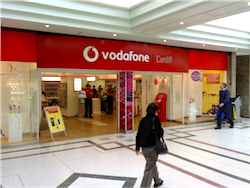Vodafone broke its silence about 4G LTE network plans in the UK on Wednesday, surprising analysts by focusing on content rather than coverage and network speeds.
The announcement comes almost a week after rival O2 (Telefónica UK) announced its plans to launch 4G in three cities, reaching up to five million people initially, with a plan to increase coverage to cover an additional two million per month thereafter.
EE launched to great fanfare last October, and is focusing its marketing efforts on being the speediest network.
Although Vodafone spent the most at the 4G auction which concluded in February, spending €906 million on valuable 2 x 10MHz blocks of spectrum in the 800MHz band, 2 x 20MHz in the 2.6GHz band plus an additional 25 MHz of unpaired spectrum in the 2.6 GHz band, the operator has chosen to focus on its partnerships with content providers Sky Sports Mobile TV and Spotify Premium.
Subscribers who sign up with Vodafone for 4G plans can pick either Sky Sports or Spotify and will get to use their service of choice for free for between six months to two years, depending on their tariff (read: Vodafone UK trumpets data, Spotify and Sky Sports as it announces 4G LTE launch).
But Ovum’s principal telco strategy analyst Emeka Obiodu believes focusing on content deals and tariff options undersells Vodafone’s strength given its 800MHz spectrum holdings and the improved in-door coverage this band offers.
“We sense that Vodafone wants to avoid the 3G lesson where it worked so hard to create the best 3G network, yet lost out as rivals, especially O2, delivered a better appealing proposition to customers,” he said.
“So this time, Vodafone is focusing on getting the commercial proposition right. We expect the deals with Spotify and Sky Sports to appeal to a lot of customers, although the downside is that Vodafone might have been forced to rush out the announcement, when it has covered only a few cities, so as to sync with the start of the Premier League.”
Vodafone will launch its network on 29 August, the same day as O2, but unlike O2 and EE whose pay monthly tariffs start from £26, Vodafone’s 4G pay monthly data tariffs will start from £34 a month (€39.50).
CCS Insight’s senior analyst for operators Kester Mann feels that including content might not be enough to convince customers to transition to 4G, and that Vodafone’s “low-key introduction” is helping EE to hold “4G network leadership”.
“The leisurely roll-out is particularly disappointing for Vodafone’s ambitions in the enterprise market. EE is making impressive progress targeting this sector which was previously dominated by Vodafone and O2. Today’s announcement could prompt it to further step up its push for high-spending corporate accounts,” he said.
In June, EE poured scorn onto its competitors’ efforts to roll out the next gen technology by doubting whether they realised how hard it would be.
Concluded Mann: “Vodafone’s announcement is underwhelming and there is nothing ground-breaking in its initial plans for 4G. The limited roll-out supports our view that the operator does not feel fully ready to bring 4G services to market but needs to fulfil a prior commitment to launch before the end of the summer. Having initially expected a start date in either April or May, we believe that Vodafone’s progress has been constrained by challenges associated with its network sharing agreement with O2.”



